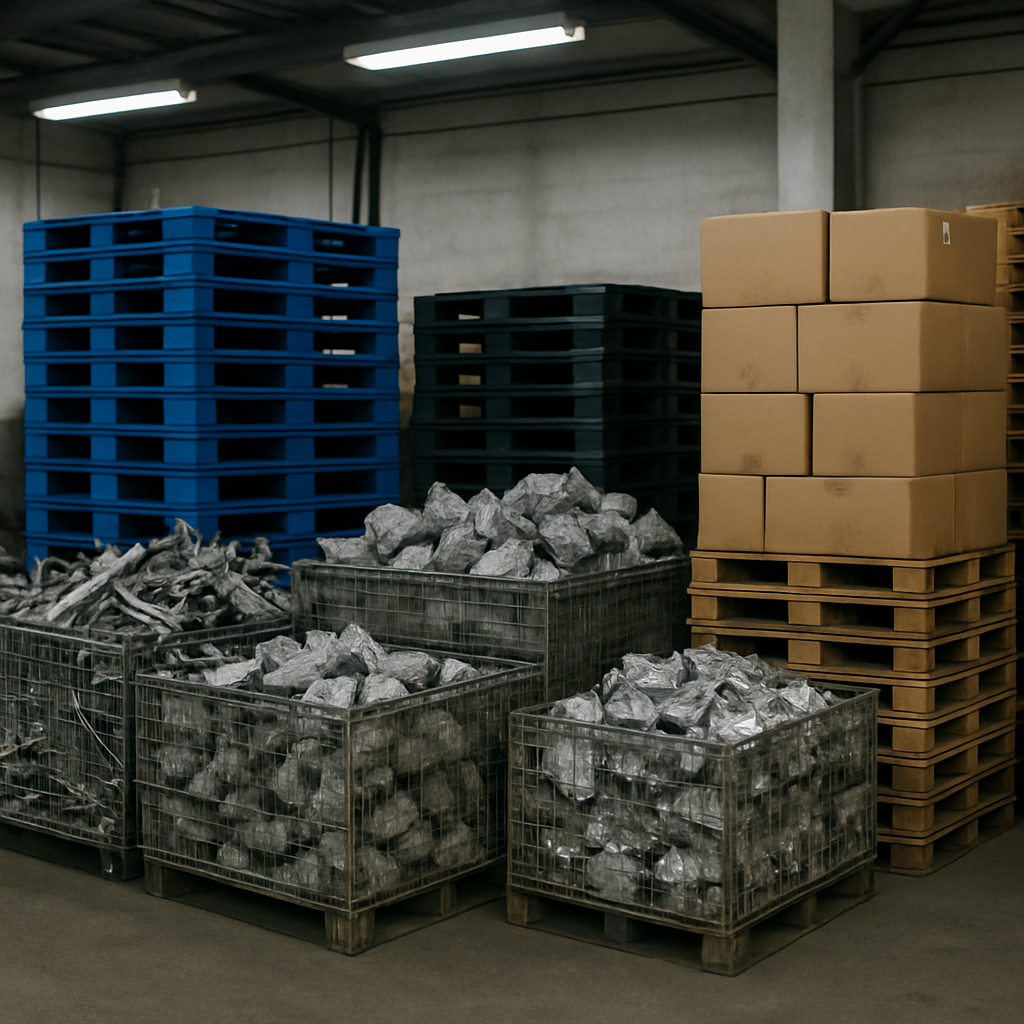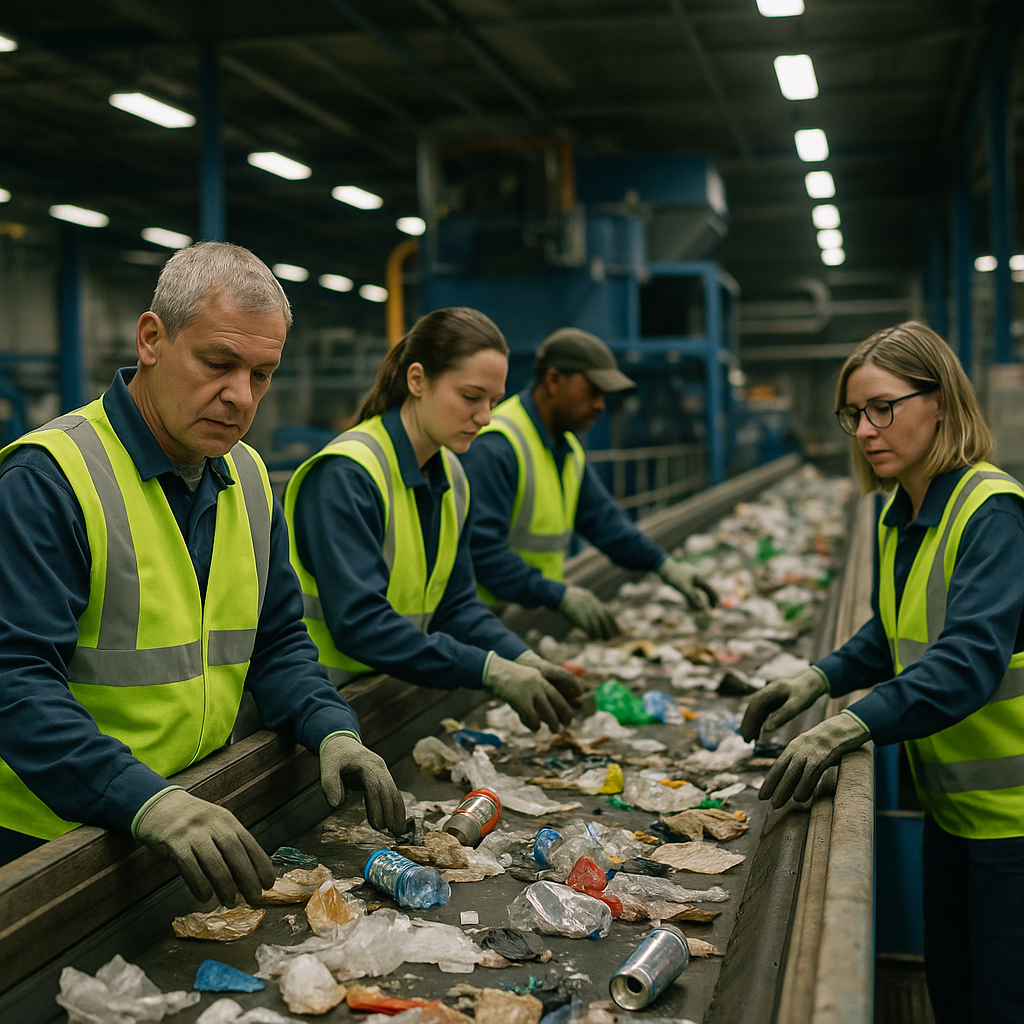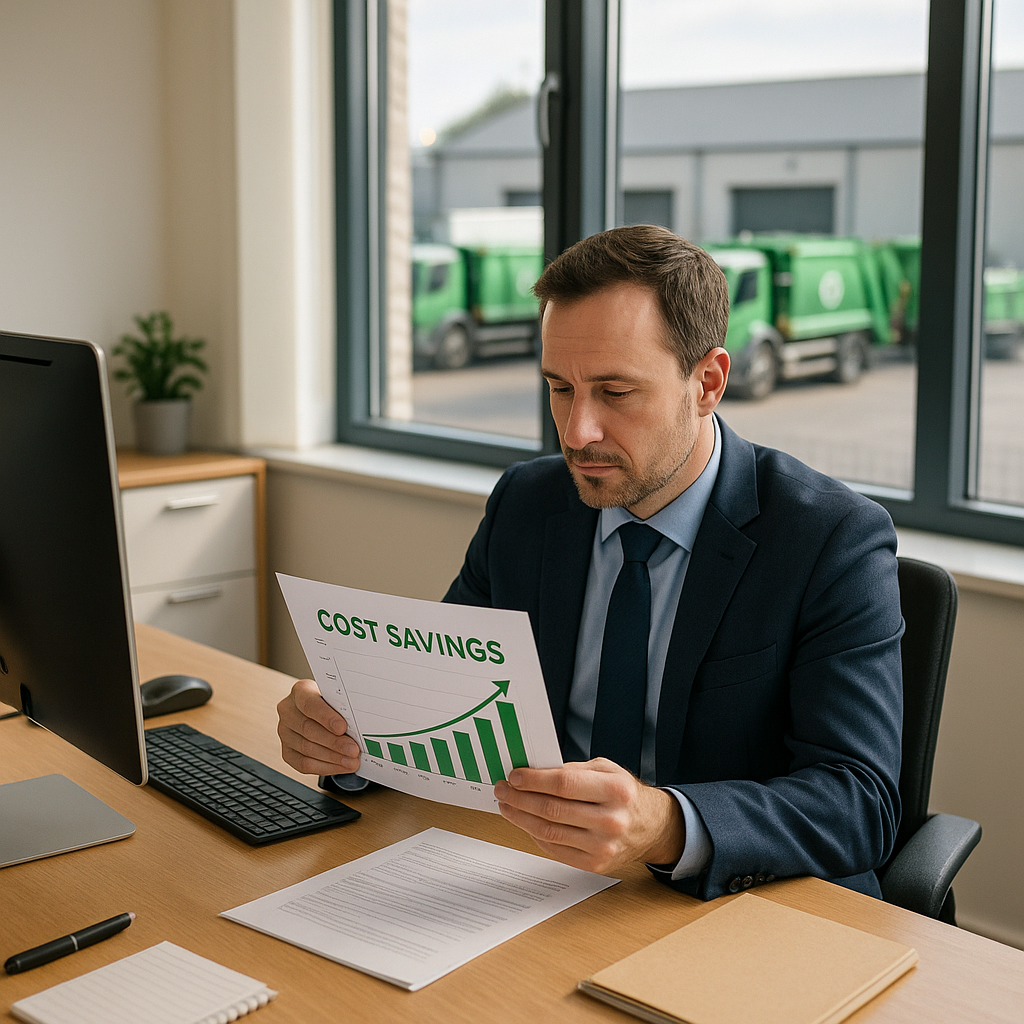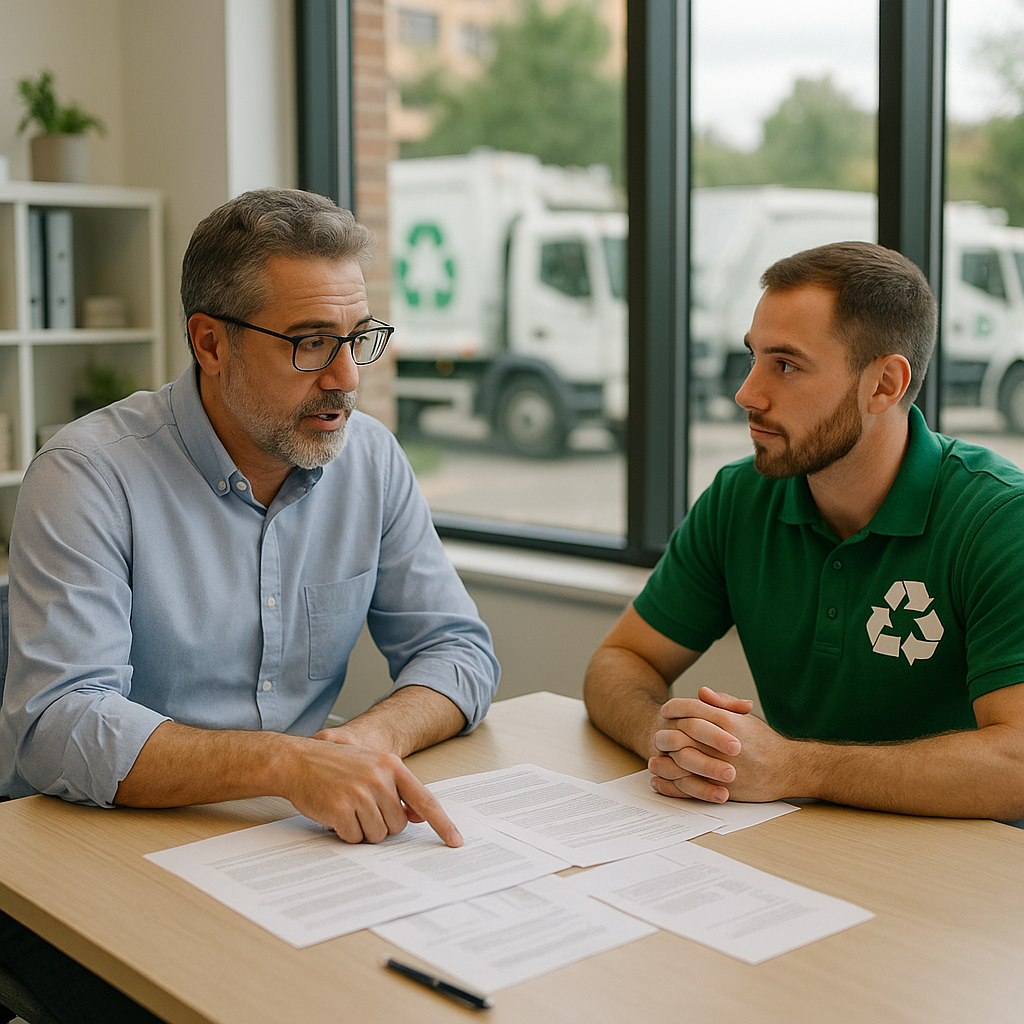5901 Botham Jean Blvd, Dallas, TX 75215
What Are Industrial Recycling Services in Houston, TX?
August 9, 2025Industrial recycling services in Houston, TX, provide essential waste management solutions that help businesses transform unwanted materials into valuable resources. These specialized services collect, process, and repurpose industrial waste materials that would otherwise end up in landfills. The growing number of recycling providers in the Houston area reflects the increasing demand for sustainable waste management practices across Texas industries.
Local companies like Excel Industrial Group and Custom Packaging Products have established comprehensive recycling programs for various industrial materials. They process everything from wooden pallets and bulk bags to plastics, cardboard, and scrap metal. These services are particularly valuable for manufacturing facilities, warehouses, and distribution centers generating large volumes of recyclable waste.
Industrial recycling offers more than just environmental protection. Businesses in Houston implementing recycling programs report significant cost savings through reduced disposal fees, potential revenue from selling recyclable materials, and reclaimed warehouse space previously used for waste storage. As sustainability becomes increasingly important for companies and their stakeholders, industrial recycling services provide a practical way to enhance environmental performance while supporting operational efficiency.
What Materials Can Be Recycled Through Industrial Services?

Industrial recycling services in Houston process a wide range of materials that might otherwise end up in landfills. These specialized facilities help companies manage waste sustainably, often offering economic benefits through resource recovery. The following materials can be recycled through industrial services:
Common Materials Accepted by Industrial Recyclers
Many industrial recycling facilities in Houston accept these primary materials commonly flowing through manufacturing, distribution, and production operations:
- Wooden Pallets – Standard shipping platforms that can be repaired, resold, or processed into mulch or biomass fuel. Recycling these items saves valuable warehouse space and reduces disposal costs.
- Plastic Pallets – Durable alternatives to wooden pallets that can be ground down and reformed into new plastic products when they reach the end of their usable life.
- Bulk Bags (Super Sacks) – Large industrial fabric containers used for transporting dry, flowable products. These flexible intermediate bulk containers (FIBCs) can be cleaned, inspected, and reconditioned for multiple uses, with each bag typically capable of 6-7 reuse cycles.
- Cardboard and Paper – Corrugated cardboard boxes, packaging materials, and paper waste can be pulped and reformed into new paper products. Many facilities offer baling services or container placement for ongoing collection.
Specialized Industrial Materials
Houston recycling services also handle more complex industrial byproducts and specialized containers:
- Industrial Plastics – This category includes various plastic types, such as polyethylene (PE), polypropylene (PP), off-spec resin, plastic film, purge material, and manufacturing scrap. Different grades are sorted and processed separately.
- IBC Totes – Intermediate Bulk Containers are rigid plastic containers within a metal cage used for storing and transporting liquids. These can be cleaned and recertified for reuse or broken down into component materials.
- Scrap Metal – Industrial recyclers accept various metals, including aluminum, stainless steel, carbon steel, copper, titanium, and lead. These materials are sorted by type and can be melted down to create new metal products.
Waste Classification and Processing
Industrial recycling services in Houston handle both hazardous and non-hazardous waste streams. The EPA provides regulatory guidelines to help classify specific substances and determine appropriate recycling methods. Professional recyclers assist businesses in identifying their waste streams and developing management plans.
Some facilities offer specialized services beyond basic collection and processing. For instance, certain providers recondition bulk bags through cleaning and inspection, extending their useful life and keeping them out of landfills. Other companies focus on plastic film recovery using optical sorters and vacuum systems to capture this traditionally difficult-to-recycle material.
| Common Materials | Processing Methods |
| Wooden Pallets | Repaired, resold, or processed into mulch or biomass fuel |
| Plastic Pallets | Ground down and reformed into new plastic products |
| Bulk Bags (Super Sacks) | Cleaned, inspected, and reconditioned for multiple uses |
| Cardboard and Paper | Pulped and reformed into new paper products |
| Industrial Plastics | Sorted by grade and processed separately |
| IBC Totes | Cleaned and recertified for reuse or broken down into components |
| Scrap Metal | Melted down to create new metal products |
For businesses generating significant volumes of recyclable materials, recyclers can set up collection equipment on-site, such as trailers for pallets, roll-off containers for metals, or balers for cardboard and plastic. This streamlines the recycling process and helps companies manage waste more efficiently while potentially generating revenue from previously discarded materials.
How Do Industrial Recycling Services Work?

Industrial recycling services operate through a systematic approach designed to efficiently manage waste materials. The process begins with a thorough waste assessment. Recycling providers evaluate the types and volumes of waste generated by a facility to identify recyclable materials and develop appropriate collection strategies.
After assessment, the focus shifts to material collection and sorting. Most industrial recycling providers offer on-site collection solutions, placing specialized containers or trailers at strategic locations throughout a facility. These collection points make it easy for employees to properly dispose of recyclable materials like metals, plastics, paper, and cardboard.
Once collected, materials are transported to recycling facilities. These facilities use advanced sorting technologies to separate different types of recyclables. Metal detectors isolate ferrous and non-ferrous metals. Optical sorters identify various plastic types. Manual sorting stations handle items that automated systems can’t process accurately.
Processing is the next crucial step. Recyclable materials undergo cleaning to remove contaminants. Metals are melted down. Plastics are shredded and pelletized. Paper is pulped. This processing transforms waste into reusable raw materials for manufacturing new products.
Many industrial recycling services provide comprehensive options tailored to specific business needs. Some companies offer mobile compactors that reduce the volume of waste before transportation, cutting logistics costs. Others provide balers for cardboard and plastic film, maximizing storage efficiency and transportation value.
The Environmental Protection Agency (EPA) plays a vital role in this ecosystem by providing guidelines for industrial waste management. These guidelines help businesses properly identify and manage hazardous materials that require special handling. The EPA’s Guide for Industrial Waste Management includes tools like the Industrial Waste Management Evaluation Model to assess potential risks from various waste streams.
Some specialized recycling companies have developed unique capabilities to enhance their services. For example, businesses with port access can efficiently export recyclable materials to international markets where demand is high. This global approach maximizes the value of recyclable materials and supports a more sustainable circular economy.
Throughout the entire process, documentation and tracking are essential. Many recycling services provide detailed reports that quantify the amounts and types of materials recycled, helping businesses monitor their environmental performance and compliance with regulatory requirements.
The efficiency of industrial recycling services heavily relies on proper material separation. Cross-contamination can significantly reduce the value and recyclability of materials. Most providers work closely with clients to implement clear labeling systems and employee training programs that ensure proper sorting at the source.
Modern industrial recycling has markedly evolved from simple waste disposal. Today’s services transform waste streams into valuable resources, reducing environmental impact while often providing financial benefits through reduced disposal costs and potential revenue from high-value recyclables.
| Material | Potential Processes |
| Wooden Pallets | Repaired, resold, or processed into mulch/biomass fuel |
| Plastic Pallets | Ground down and reformed into new plastic products |
| Bulk Bags (Super Sacks) | Cleaned, inspected, and reconditioned for multiple uses |
| Cardboard and Paper | Pulped and reformed into new paper products |
| Industrial Plastics | Sorted and processed separately by type |
| IBC Totes | Cleaned, recertified for reuse, or broken down into components |
| Scrap Metal | Melted down to create new metal products |
What Are the Benefits of Using Industrial Recycling Services?

Industrial recycling services provide substantial advantages for businesses across various sectors. Companies implementing effective recycling programs not only aid environmental sustainability but also enhance their bottom line through multiple avenues.
Environmental Impact Reduction
A key benefit of industrial recycling is minimizing environmental impact. By diverting waste from landfills, businesses considerably reduce greenhouse gas emissions linked to waste decomposition. Additionally, recycling conserves natural resources by decreasing the need for raw material extraction and processing, which usually requires substantial energy and causes pollution.
The United States Environmental Protection Agency reports that recycling and reuse activities in a single year have contributed to 681,000 jobs and a considerable reduction in millions of metric tons of carbon dioxide emissions. For manufacturing operations generating substantial waste, this environmental benefit is especially significant.
Cost Savings and Revenue Generation
Industrial recycling positively affects a company’s financial performance through several channels. It reduces waste disposal costs, which are often significant for manufacturing operations. Many recycling services operate on fixed costs, meaning the more materials you recycle, the more cost-effective the program becomes on a per-unit basis.
Businesses can also earn revenue by selling recyclable materials like metals, paper, and certain plastics. For instance, aluminum recycling is particularly lucrative, with recycled aluminum being nearly half the cost of newly produced aluminum. This creates a dual benefit: revenue from selling scrap and savings when purchasing recycled raw materials for production.
Space Utilization and Operational Efficiency
Industrial recycling enables businesses to optimize their workspace and improve operational efficiency. Proper waste management reduces clutter and frees up valuable space for productive activities, especially in manufacturing facilities where space is limited.
Many industrial recycling providers offer specialized equipment like balers, compactors, and sorting systems that further streamline waste management processes. These tools minimize the time employees spend handling waste, allowing for more efficient operations overall.
| Benefit | Details |
|---|---|
| Job Creation | Recycling and reuse activities in the United States accounted for 681,000 jobs, $37.8 billion in wages, and $5.5 billion in tax revenues. |
| Cost Savings | Businesses save on waste disposal fees and can generate additional income by selling recycled materials. |
| Reduced Disposal Costs | Recycling reduces waste sent to landfills, minimizing disposal costs. |
| Revenue Generation | Recycled materials like metals can be sold, creating a revenue stream. |
| Regulatory Compliance | Helps businesses comply with environmental waste management regulations, avoiding fines and legal issues. |
Regulatory Compliance
Environmental regulations on waste disposal are becoming increasingly stringent worldwide. Implementing an industrial recycling program helps businesses stay compliant, avoiding potential fines and legal issues. Recycling services typically stay updated on changing regulations, ensuring your waste management practices meet all requirements.
This compliance advantage extends beyond avoiding penalties. Companies with robust environmental practices often find it easier to secure permits for expansion or new operations, creating a competitive edge in highly regulated industries.
Enhanced Corporate Image and Brand Value
Consumers and business partners increasingly prioritize sustainability in purchasing decisions. A commitment to industrial recycling signals corporate responsibility and can significantly enhance a company’s reputation. This improved brand image can lead to increased customer loyalty, stronger partnerships, and even advantages in bidding processes where environmental practices are considered.
Some companies successfully leverage their recycling programs in marketing efforts, highlighting their sustainability initiatives to attract environmentally conscious customers and partners. This is particularly effective in industries where environmental impact concerns stakeholders.
Innovation and Continuous Improvement
Focusing on recycling often leads to innovation in product design and manufacturing processes. When companies analyze their waste streams, they often identify opportunities to redesign products for easier recycling or to modify processes for less waste generation.
These innovations frequently result in more efficient operations and improved products. For example, automotive manufacturers with aggressive recycling programs have developed new methods for using recycled materials in vehicle components, reducing both costs and environmental impact.
Sustainability Consulting and Reporting
Many industrial recycling service providers offer additional consulting services to help businesses track and improve their environmental performance. These services can include waste audits, sustainability reporting, and recommendations for process improvements.
Such reporting is increasingly valuable as investors, customers, and regulators demand greater transparency regarding environmental impacts. Companies with robust data on their recycling efforts can more effectively communicate their sustainability achievements to stakeholders.
How to Choose an Industrial Recycling Service in Houston

Choosing the right industrial recycling service in Houston involves careful consideration of several key factors. The provider you select significantly impacts your waste management efficiency, compliance status, and potentially your bottom line. Houston’s industrial sector generates diverse waste streams that require specialized handling and processing.
When evaluating potential recycling partners, begin by assessing the range of materials they accept. Some providers handle only specific categories like metals or plastics, while others offer comprehensive solutions for multiple waste streams. This is particularly important if your operations generate various types of recyclable materials.
Transportation logistics are another crucial consideration. Check whether the recycler offers on-site collection, drop-off options, or specialized transportation for hazardous or bulky materials. The right transportation arrangement ensures efficient waste handling without disrupting your operations.
Processing Capabilities and Industry Experience
A recycler’s processing capabilities directly affect their ability to handle your specific waste materials. Look for companies equipped with modern sorting technology, appropriate equipment, and efficient processes that maximize recovery rates. Advanced facilities typically achieve higher recycling percentages and better quality of recovered materials.
Industry experience is significant when choosing a recycling partner. Providers familiar with your industry understand the specific challenges and regulatory requirements you face. For example, manufacturing facilities have different recycling needs than healthcare institutions or logistics companies.
Safety records and compliance history should be thoroughly examined. Request information about a provider’s environmental compliance, permits, and safety protocols. Companies with strong records usually maintain proper documentation and demonstrate a commitment to regulatory compliance.
Additional Services and Specialization
Many industrial recyclers offer valuable additional services beyond basic collection and processing. These might include waste audits, data reporting for sustainability initiatives, staff training, or consulting on waste reduction strategies. These supplementary offerings can enhance your overall waste management program.
Some Houston recyclers specialize in particular materials or industries. A specialized provider might offer deeper expertise and more tailored solutions for your specific needs, such as focusing exclusively on electronic waste or specializing in construction debris or industrial chemicals.
When examining potential partners, ask about their sorting processes and contamination policies. Understanding how they handle mixed or contaminated materials helps you assess the thoroughness of their recycling operations and prepare your materials accordingly.
| Factor | Description |
|---|---|
| Range of Materials | Consider whether the recycler accepts a comprehensive range of materials such as metals, plastics, and electronics. |
| Transportation Logistics | Evaluate if the recycler offers on-site collection, drop-off options, and specialized transportation for hazardous materials. |
| Processing Capabilities | Look for advanced sorting technology and modern equipment to maximize recovery rates. |
| Industry Experience | Select providers with an understanding of your specific industry needs and regulatory requirements. |
| Safety Records | Examine environmental compliance, permits, and safety protocols of the provider. |
| Additional Services | Inquire about offerings like waste audits, sustainability reporting, and waste reduction consulting. |
| Pricing Structure | Understand the fee model, whether by weight, volume, or fixed fees, and check for rebates on recyclable materials. |
| Contract Terms | Scrutinize contract length, termination clauses, and price adjustment provisions for flexibility. |
| Reliability | Research financial stability, industry reputation, and customer satisfaction levels of the provider. |
Financial Considerations
Pricing structures vary significantly among industrial recyclers. Some charge by weight or volume, while others offer fixed monthly fees or service-based pricing. Request detailed quotes from multiple providers for accurate comparisons. Be sure to understand all potential fees, including transportation, processing, and container rental costs.
Inquire about potential rebates for recyclable materials. Some recyclers offer revenue-sharing programs for valuable materials like metals, cardboard, or certain plastics. These rebates can offset service costs and improve your recycling program’s financial performance.
Contract terms deserve careful scrutiny. Pay attention to contract length, termination clauses, price adjustment provisions, and service guarantees. Flexibility in these areas can be valuable as your needs evolve or if service issues arise.
Long-term reliability should factor into your decision. Research the company’s financial stability, reputation in the industry, and customer satisfaction levels. A provider with a proven track record is more likely to deliver consistent service over time.
After narrowing your options, request site visits to potential recyclers’ facilities. This firsthand observation provides valuable insights into their operations, cleanliness, organization, and commitment to proper material handling.
Conclusion: Maximizing the Value of Industrial Recycling in Houston

Industrial recycling services in Houston offer significant environmental and economic benefits. Businesses that implement comprehensive recycling programs reduce their waste footprint while conserving valuable natural resources. Houston’s recycling industry is evolving, providing innovative solutions to help companies meet sustainability goals while enhancing their financial performance.
By selecting the right recycling partner, Houston businesses can transform waste management from a cost center into a strategic advantage. The benefits extend beyond environmental protection, including job creation, reduced operational costs, and an improved corporate image in an increasingly eco-conscious marketplace. Contact Okon Recycling at 214-717-4083 for industrial recycling solutions tailored to your business needs.
